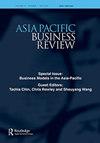Upgrading new product development performance in digital context: a configuration analysis based on fsQCA
IF 2
4区 管理学
Q3 BUSINESS
引用次数: 0
Abstract
ABSTRACT New product development (NPD) is necessary for enterprises’ growth and the maintenance of competitive advantage. Although previous studies have explored the multiple antecedents of NPD performance, most of them consider the effect of antecedents in isolation, neglecting their interdependence. Drawing on complexity theory, the study presents a configuration model that combines six antecedents based on the Technology-Organization-Environment (TOE) framework. The results of fuzzy-set qualitative comparative analysis (fsQCA) show that digital technology application, product innovation, functional coordination, user participation, peer competition and environmental turbulence need to combine with each other in order to produce high NPD performance. The combination of product innovation, functional coordination and user participation plays an important role in NPD. The complementary effects of digital technology application, product innovation, functional coordination and user participation on NPD performance are demonstrated.数字化环境下新产品开发绩效提升:基于fsQCA的配置分析
新产品开发是企业成长和保持竞争优势的必要条件。虽然以往的研究已经探索了NPD绩效的多个前因,但大多数研究都是孤立地考虑前因的影响,而忽略了它们之间的相互依赖性。在复杂性理论的基础上,提出了基于技术-组织-环境(TOE)框架的6个前因组合的配置模型。模糊集定性比较分析(fsQCA)结果表明,数字技术应用、产品创新、功能协调、用户参与、同行竞争和环境动荡需要相互结合才能产生高的新产品开发绩效。产品创新、功能协调和用户参与三者的结合在新产品开发中发挥着重要作用。论证了数字技术应用、产品创新、职能协调和用户参与对新产品开发绩效的互补效应。
本文章由计算机程序翻译,如有差异,请以英文原文为准。
求助全文
约1分钟内获得全文
求助全文
来源期刊

Asia Pacific Business Review
Multiple-
CiteScore
4.40
自引率
13.80%
发文量
70
期刊介绍:
The growth of the Asia Pacific region and the rising presence of its multinationals in world markets has raised a number of questions about the origins of national economic success. Asia Pacific Business Review addresses these key issues and draws together the lessons of the analysis of culture, economies, history, politics and societies in the area, in order to explore business-related phenomena in the Asia Pacific countries, both in their general and specific contexts. The Review is intended for both academics and interested observers, contains the contributions of recognized experts, and is essential to anyone seeking the latest research on Asia Pacific business in a readily available, approachable form. We welcome articles which deal with nations and societies in the Asia Pacific region, namely those in East Asia and South-East Asia (but not South Asia), including those in APEC and ASEAN, individually or comparatively. Of interest also are contributions on the Asia Pacific economies, comparing those inside with those outside, or those investing in it. We do not, however, publish papers based solely on countries from outside the region.
 求助内容:
求助内容: 应助结果提醒方式:
应助结果提醒方式:


